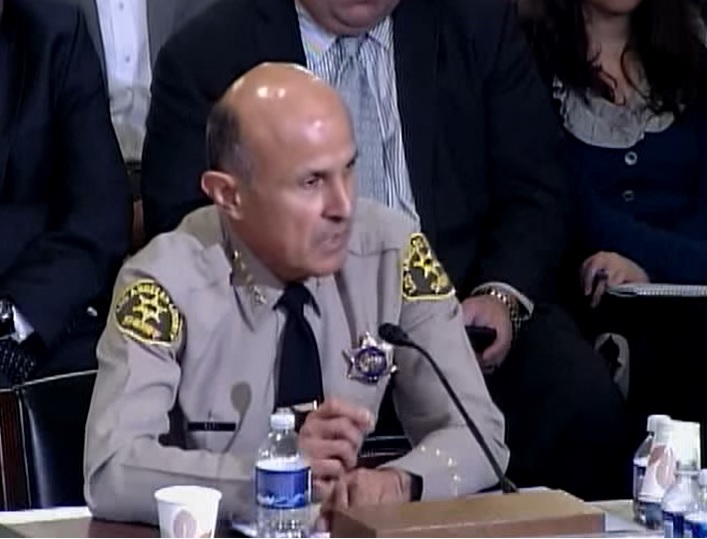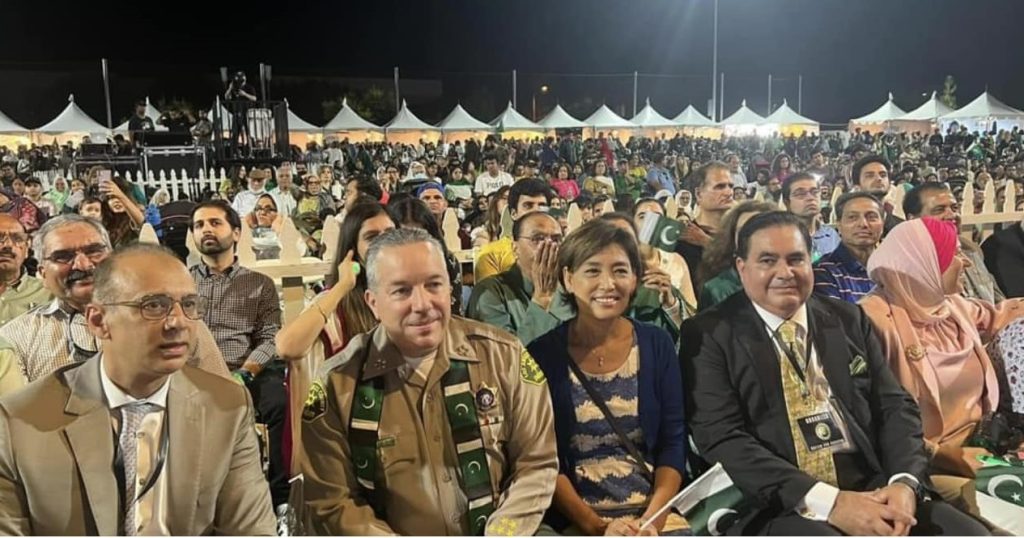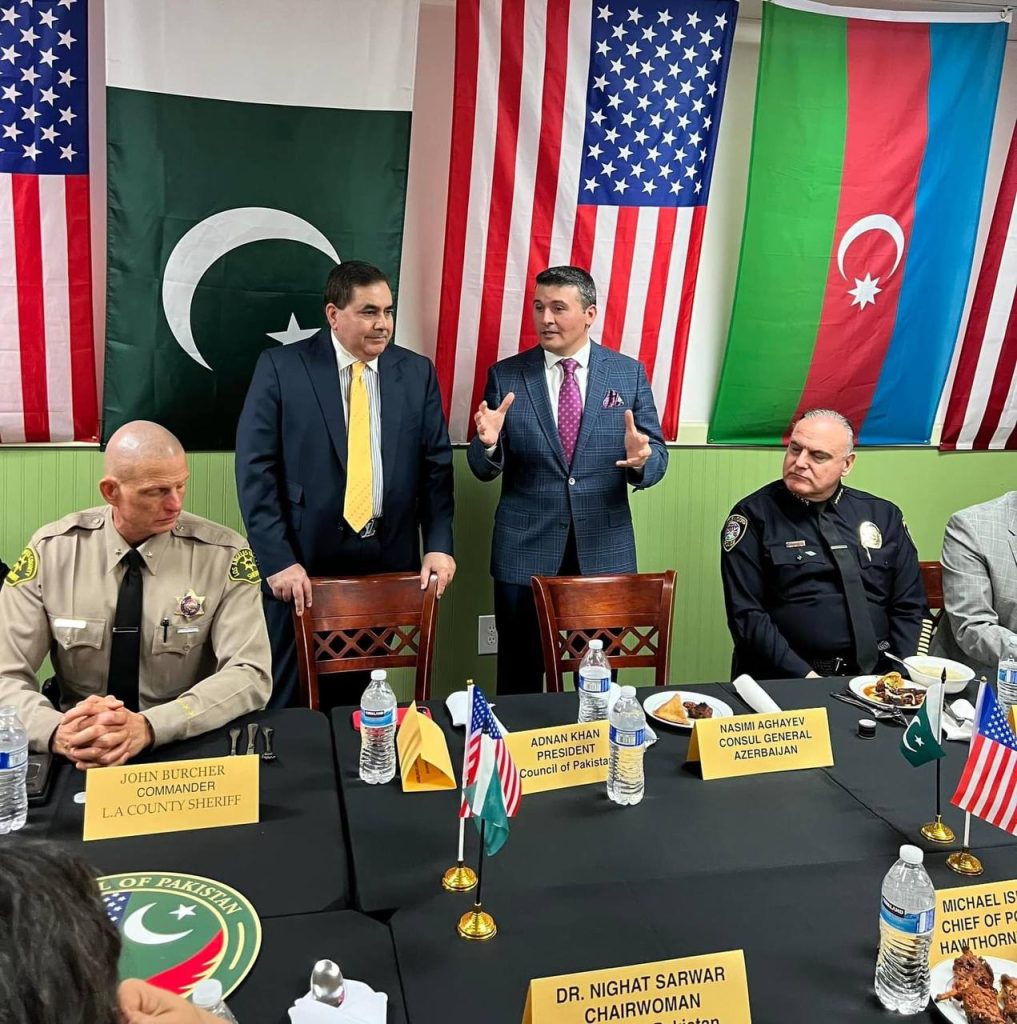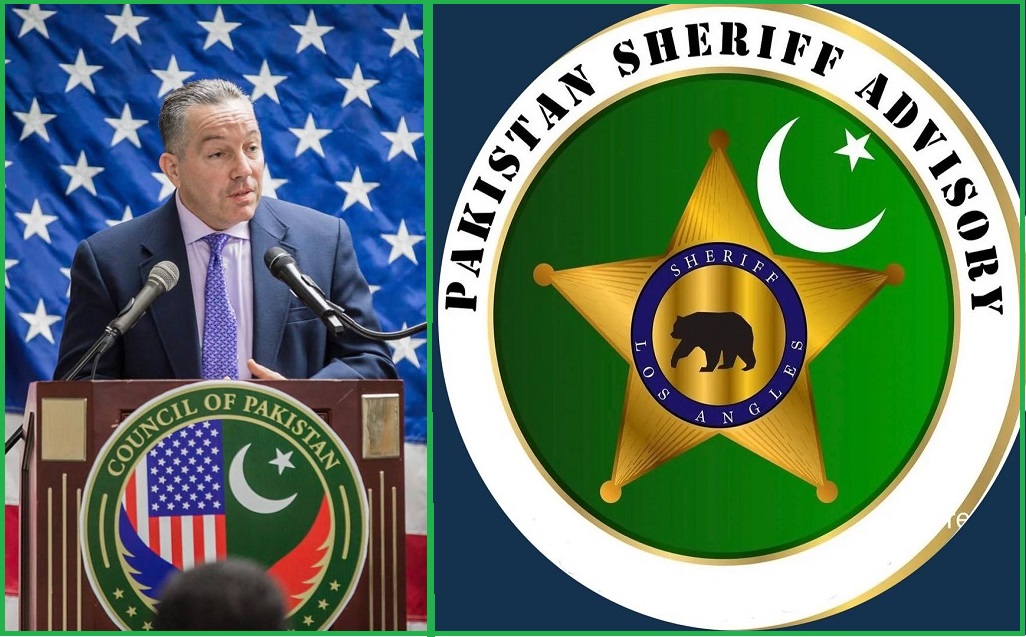A Los Angeles-based network of Pakistani Americans with links to Pakistan’s government has infiltrated local law enforcement agencies and is using its influence with sheriff deputies and police chiefs to promote the Islamic Republic’s agenda. Represented by two competing nonprofit organizations, this network includes affluent Pakistani Americans who serve as official community advisors, police chaplains, donors, and even campaign surrogates to local police leaders.
For a minority community of just 18,000 LA residents – a tiny fraction of the city’s 4 million inhabitants – Pakistani Americans enjoy unusual access to law enforcement officials, who are rarely absent from events commemorating Pakistan or criticizing its enemies. The Pakistani community enjoys this attention thanks to the efforts of two local organizations: the Council of Pakistan American Affairs (COPAA) and its rival successor, the Council of Pakistan, Inc. (COP).
COPAA and COP are easily confused, and not just because of their similar-sounding names. Both groups are deeply entangled in Pakistani government interests. Working with Pakistan’s Ministry of Foreign Affairs to advance Pakistan’s image in the United States, they appear to serve as publicity agents for the Islamist-aligned Pakistan Tehreek-e-Insaf (PTI) party and other government offices.
Jet-Setting Sheriff
The origins of the relationship between Pakistani loyalists and Los Angeles-area law enforcement can be traced as far back as 2004, when LA County Sheriff Leroy Baca visited Pakistan at the expense of “private donors” to swap counter-terrorism tips. Flanked by his deputies, Baca’s visit included meetings with Pakistani intelligence, local politicians, and even President Pervez Musharraf.
Is he running for office in this country?
A Pakistani citizen responding to the pro-Pakistan boosterism of LA County Sheriff Leroy Baca on a trip to that country in 2004.
“At times, Baca seemed as much a booster for Pakistan as the Pakistanis were,” wrote a Los Angeles Times reporter who accompanied the sheriff and his entourage. Going against the recommendations of U.S. authorities, the sheriff – who enjoyed the company of armed guards throughout the tour — told his hosts that he intended to lobby the U.S. State Department to do away with a terrorism advisory discouraging civilian travel in Pakistan.

“Is he running for office,” a Pakistani citizen asked, “in this country?”
It was during this unofficial state visit that Baca became closely acquainted with COPAA, which sent four board members along with the sheriff. Emerging from the trip as Baca’s “devoted supporters,” they used their connections to “open doors” for the delegation, chartering last-minute flights and securing high-ranking meetings with Pakistani elite figures.
Having cemented his relationship with Pakistan, Baca returned home to found two community law enforcement initiatives that are today led by COPAA and COP. Although the veteran lawman eventually traded in his khaki sheriff’s uniform for prison stripes — the result of a prisoner abuse scandal — his legacy survives today. The LA County Sheriff’s Department (LASD), the LA Police Department (LAPD), and numerous other local and federal law enforcement agencies have come under the sway of suspected Pakistani proxies.
Unfeigned Affection
Founded in 1996, COPAA claims to seek “an American society that embraces diversity” so that “immigrants can advance and thrive personally, economically and socially.” In fact, COPAA’s mission appears to have little to do with Pakistani Americans and is instead focused on advancing the interests of Pakistan and the PTI party.
Pakistani dignitaries do not hide the nonprofit’s role in fulfilling their country’s foreign policy objectives. The late Consul General Abdul Jabbar Memon once unabashedly instructed COPAA President Faisal Jameel to “promote Pakistan’s soft image in [the] USA” and to play “a massive role” in strengthening the two countries’ “bilateral relations.”
While many cultural organizations in the U.S. are dedicated to such activities, they are not typically led by dues-paying members of a registered foreign political party.
PTI-USA is the American chapter of a political party founded by former Pakistani Prime Minister Imran Khan. In recent years, PTI has dominated provincial and national elections in Pakistan with a populist, anti-American appeal built around Khan’s vision of an “Islamic welfare state.”
The party is very popular among the Pakistani diaspora, with “diehard” American adherents located most prominently at the party’s centers of power in Texas and California. PTI-USA, which registered as a foreign agent in 2013, is also part of a Houston-based Islamist network linked to jihadists in Kashmir. In LA, PTI-USA operates as an apparent parent organization to COPAA.
For instance, COPAA advisory board member Razaq Chaudhry is the former president and treasurer of PTI-USA. An official PTI website describes Chaudhry, who previously served as COPAA’s president, as “a long-time supporter of PTI and a local friend of Imran Khan.” He has organized events encouraging Pakistani Americans to join PTI and has hosted election victory celebrations where he and others “demonstrated unfeigned affection for Imran Khan and his party.”
In 2017, party members gathered at Chaudhry’s upscale Chino Hills residence to celebrate a legal ruling that barred Imran Khan’s most competitive political rival from running in future elections. Attendees “wore PTI scarves and caps and chanted slogans in favor of … Imran Khan,” according to Pakistan Link, demonstrating a cult-like subservience to party leaders.
Meanwhile, former COPAA councilmember Naim Ahmed is also a PTI-USA member. According to his Facebook profile, Ahmed worked for PTI and was an active member of its Chicago branch. In October, he participated in a 70th birthday celebration for the “Former and InShaAllah [Allah willing] Future Prime Minister [Imran Khan].”
COPAA regularly hosts foreign PTI officials, from visiting dignitaries to members of the Pakistani legislature. A 2020 panel featured Pakistani Ambassador Asad Majeed Khan and Foreign Minister Shah Mahmood Qureshi. The following year, COPAA publicized a meeting with former PTI politician Uzma Kardar, a member of the Punjab Assembly.
In addition to providing a home to PTI-USA agents, at least one COPAA member has run afoul of the U.S. government. Rahim Sabadia, a Department of Defense contractor and COPAA member, allegedly lost his security clearance in 2011– along with a lucrative government contract – because of his role in financing a host of radical charities involved in terror finance.
The Fracture
Originally a single organization, COPAA fractured into two separate but parallel nonprofits in 2017, after a contested election involving several leadership positions. Former board members Imran and Ifrat Sharief lost a lawsuit accusing COPAA and fellow board members of defamation and libel. However, the plaintiffs were not about to take their legal defeat sitting down.
Shortly after the case’s dismissal, the Council of Pakistan, Inc. (COP) was born. Since this split, quite a few former COPAA board members have jumped ship and joined COP, and the two organizations even share advisory board members. To complicate matters even further, both groups prefer to be called the “Council of Pakistan.”
COP appears to be just as problematic as its forerunner and is likewise regarded by the Pakistani regime as a useful surrogate. So useful, in fact, that COP board member Jamal Khwaja recently received a Medal of Excellence from Pakistani President Arif Alvi, PTI’s co-founder and a former member of Jamaat-e-Islami, a violent South Asian Islamist movement.
Amna Qazi, an auxiliary board member at COP, has publicly celebrated PTI election victories and frequently cites PTI’s official Twitter page. She also served on the LA City Human Relations Commission, using her position, for example, to promote an Azerbaijan-Pakistan-Turkey Conference that took place in 2019. Besides fostering improved relations between the three states, speakers at the conference, which Qazi attended, blasted both Indian Kashmir and Armenia. Qazi’s efforts earned accolades from PTI and embassy officials.
Pakistan House, or the Consulate General of Pakistan located in West Hollywood, is something of a second home to COP leaders, who regularly trade awards with Pakistani officials and use the facility to promote Pakistan’s foreign relations. For instance, Imran Sharief received a commendation letter in 2018 from Pakistani Ambassador Aizaz Ahmad Chaudhry, who wrote that he was “confident” in Sharief’s ability to shape the future of U.S.-Pakistan relations.
COP also uses the consulate in LA to promote Pakistan’s foreign policy agenda. Following a military standoff between India and Pakistan in 2019 – the result of a deadly car-bombing in India carried out by a Pakistan-backed terrorist group – COP members hosted a leadership summit at the consulate and “praised” Imran Khan’s “efforts in handling the delicate situation.” Less than a year later, Imran Sharief shared the podium with the consul general at an event held to “express solidarity with Kashmiris who are struggling for independence from Indian Occupation.”
In late November, COP hosted Pakistani Ambassador to the U.S. Masood Khan, honoring him with a plaque bearing the group’s logo. The ambassador – an appointee of Imran Khan – is a noted supporter of extreme Islamist causes and has long aligned himself with radical organizations accused of serving as the Pakistani regime’s proxies in the United States.
Prior to Amb. Khan’s official appointment, U.S. Rep. Scott Perry (R-PA) penned a letter calling the envoy a “bona fide terrorist sympathizer” and asking the Biden administration to “reject any effort by the Government of Pakistan to install this jihadist as Pakistan’s Ambassador to the United States.” He was later joined by two of his colleagues, who urged the Department of Justice to investigate the ambassador’s terrorist links.
In his November speech at Imran Sharief’s sprawling residence, Amb. Khan praised COP and Pakistani Americans for working as a “national asset” and advancing Pakistan’s interests within American legislatures. The ambassador called on COP’s wealthy board members to invest in companies inside Pakistan – an appeal that the nonprofit’s members have enthusiastically accepted.
Pakistani Partners in Policing

On the occasion of Pakistan’s 75th Independence Day, former LA County Sheriff Alex Villanueva sat as a guest of honor at a local celebration, a green and white scarf emblazoned with miniature Pakistani flags draped over his broad shoulders. Wedged between two senior COP officials, Villanueva was attending his second Pakistani Independence Day event in a matter of hours, both of which were organized by the council’s leaders.
Along with the sheriffs before him, Villanueva rarely missed a Pakistani gathering of any consequence, appearing at conferences, heritage festivals, and even bringing out the LASD Honor Guard to welcome a visiting PTI official. He was merely repeating a tradition first laid out by his predecessor, Sheriff Baca, who was instrumental in founding two police advisory groups led by COP and COPAA. .
One of these, the Muslim-American Homeland Security Congress (MAHSC), is an alliance of Islamist organizations that consistently defend extremists and work to undermine counter-terrorism strategies. Besides including COPAA, a MAHSC pamphlet lists among its members: the Hamas-linked Council on American-Islamic Relations (CAIR) and the Muslim American Society, which federal prosecutors have called the Muslim Brotherhood’s “overt arm” in America.
Sheriff Baca was forced to answer for his relationship with these Islamist groups during a House Homeland Security Subcommittee hearing in 2010. He engaged in a shouting match with Republican Rep. Mark Souder of Indiana, who accused the sheriff of “giving legitimacy to groups that fund Hamas,” a U.S.-designated terrorist entity.
Souder was referring to CAIR, which was listed only three years earlier as an unindicted conspirator in a landmark terror finance case. As a result of the trial. a prominent CAIR official was sentenced to a 65-year sentence for funneling millions of dollars to Hamas. Nevertheless, Baca insisted that, “CAIR is not a terrorist-supporting organization,” basing his assessment not on police intelligence or courtroom evidence, but on his “interaction” with the group.
Deputizing Extremists
Fresh from his 2004 trip to Pakistan, Baca quickly founded the Pakistan Sheriff Advisory Council, one of three LASD community advisories that COP currently controls. PSAC’s namesake implies that it represents the Pakistani state rather than Pakistani Americans. Notably, the advisory council’s logo includes an LASD sheriff’s badge superimposed over a green background with a white star and Islamic crescent – the flag of Pakistan.
PSAC arranged a second trip to Pakistan for Baca and other officers in 2008, who met once again with the country’s political elites and various police chiefs. The trip was hailed as “a great success in initiating well-meaning collaborative programs … to fight terrorism and crime,” even as Pakistani military and intelligence were funding and training Taliban fighters to kill Americans in Afghanistan.
Today, COP executives are personally invested in the sheriff’s department. COP’s founder Imran Sharief lists himself as an “L.A. Sheriff advisor” on LinkedIn, likely a reference to his work with Villanueva and his recent successor, Robert Luna. Likewise, COP President Adnan Khan is so invested in police politics that he campaigned for Villanueva in 2018, while Mr. Khwaja promoted an attack ad accusing Luna, an African American, of “racial bias” against black police officers.
COP board member Qazi Asad is chairman of the sheriff’s Multi-Faith Based & Community Advisory Council, and he served for years as LASD’s Muslim chaplain, despite questions about his qualifications. In a sign of the council’s influence with local police, Asad was also appointed LAPD reserve chaplain in 2009, a move that upset local Muslim leaders, who “grumbled privately about not being consulted about Asad’s selection.”
Their complaints appeared to be warranted; Asad does not seem to have any formal schooling in religion. An LA Times article discussing his chaplaincy describes him as an insurance salesman who served “informally as a religious advisor to other Muslims,” holding “weekly spiritual classes from a storefront office space in Inglewood.”
Finally, LA County law enforcement are not alone in trusting organizations that are linked to a foreign government known to sponsor terrorism. At least four founding members of COP are graduates of the FBI Citizens Academy, a six-to-eight week program that provides an “inside look at the FBI,” including firearms training and other police tactics.
Despite the FBI’s mandate to combat “foreign influence,” agents from the FBI field office in LA are regulars at COP functions, including a “9/11 commemoration event” at the Islamic Center of Yorba Linda, which also featured guests from LASD, LAPD, and the Department of Homeland Security.
The Yorba Linda mosque was an odd choice of venue for a 9/11 tribute. A decade after the tragic events, throngs of demonstrators gathered outside of the suburban mosque to protest a fundraising dinner that included headline speeches from two controversial figures: Amir Abdel Malik Ali and Siraj Wahhaj.
Malik Ali is a rabid anti-Semite who claims that Jews were behind the 1993 World Trade Center bombing and 9/11. Meanwhile, Wahhaj was named as a possible co-conspirator in the 1993 attack, and he was a character witness for “Blind Sheikh” Omar Abdel-Rahman, who was convicted of conspiracy in the World Trade Center bombing.
Representatives of LASD, LAPD, and the FBI did not respond to questions about their relationship with COPAA and COP.
Anti-Armenian Hate Fest

Since at least 2018, consul generals from three countries have come together at COP’s invitation to celebrate their close relations. The Azerbaijan-Pakistan-Turkey Brotherhood Celebration is billed as an opportunity for the Muslim-majority nations to acknowledge their collective values and interests – including their shared enmity for common geopolitical enemies.
On the occasion of the second tripartite conference in 2019, leaders focused on “human rights violations” in Kashmir and the disputed territory of Nagorno-Karabakh, home to an Armenian majority breakaway state that Azerbaijan would invade just months later.
When the three consulates met again at the council’s event in 2021, the anti-Armenian rhetoric only intensified. Only this time, senior officers overseeing multiple police jurisdictions were on hand, effectively endorsing views that are considered deeply offensive to the Armenian American community.
COP President Adnan Khan set the tone with a speech declaring: “the Armenian army has committed genocide against Azerbaijani people. The people of Pakistan demand justice for Azerbaijan,” he said, referring to recent fighting in Nagorno-Karabakh. “The destruction of houses of worship, the destruction of cities committed by the Armenian army has to be addressed, and the Armenian government has to be held accountable.”
Backed by Turkey, Azerbaijan launched a full-scale invasion in 2020 to reclaim the Nagorno-Karabakh region. Azerbaijan’s attack was dubbed “the worst cultural genocide of the 21st century.”
Nevertheless, the consul generals of Azerbaijan and Turkey attending the 2021 conference also took turns beating up on Armenia. Azerbaijan Consul General Nasimi Aghayev deplored Armenia’s “barbaric occupation” of Artsakh and accused it of desecrating mosques by turning them into “pigsties and cowsheds.”
Top-ranking officers from LASD and smaller police departments in Hawthorne and Inglewood were treated to a screening of an Azerbaijani state propaganda film called Cultural Genocide in the Caucuses: The Worst Cultural Genocide of the 21st Century. They were joined by leaders of the Islamic Center of Inglewood, a local mosque that was part of a 2005 terrorist recruitment case involving three of its congregants.
Mosque leaders, who also happen to serve on COP’s board of directors, provided a one-sided account of a recent state-sponsored trip to Azerbaijan. They described stops at “liberated cities” captured by Azerbaijani troops inside Nagorno-Karabakh.
In fact, COP makes a habit of attending similar anti-Armenian events. A 2019 event hosted by a prominent local Islamist leader, and a 2021 meeting with Azerbaijani and Pakistani diplomats, were each organized to disparage Armenia and accuse it of the worst human rights offenses. While these divisive events escaped notice from local Armenians, Sheriff Villanueva was forced to cancel an August 2020 forum scheduled to “discuss concerns with the Azerbaijani American community” after facing a backlash from local Armenian leaders.
The presence of police leaders at events that inflame decades-old tensions between diaspora communities has the potential to foment violent unrest. Case in point: on July 21, 2021, LA police were forced to break up clashes outside the Consulate of Azerbaijan, where Armenian Americans were gathered to protest Azerbaijani military aggression.
Responding to the violence, COP issued a press release that blamed the Armenian community for the violence, citing “demon-inspired hate speech” and “barbarism” from the Armenian side.
A Merging of Interests
COPAA and its younger spinoff each represent a dangerous merging of foreign and Islamist influences. Their true interests are self-evident: uplifting Pakistan’s PTI, punishing its international enemies, and promoting Islamist networks with links to Kashmiri jihadists and domestic extremists. In fact, COPAA and COP appear to be nothing more than publicity agents for a Pakistani political party that advocates for Islamic socialism and responds to political dissent with censorship and intimidation.
The threat posed by these organizations is made more formidable by the backing of local law enforcement agencies. Police chiefs and sheriff deputies offer an air of legitimacy both organizations use to advance foreign objectives.
In an age of increasing foreign interference in U.S. politics, Americans deserve complete transparency: the organizations calling themselves the Council of Pakistan should both be investigated as possible foreign agents, clarifying their standing as an apparent arm of the Pakistani Consulate and suspected proxies to a foreign Islamist political party. Perhaps then, law enforcement leaders will decline their numerous invitations.
Jenna Wright is a writer for Focus on Western Islamism.
Benjamin Baird is the Director of MEF Action, an advocacy project of the Middle East Forum
